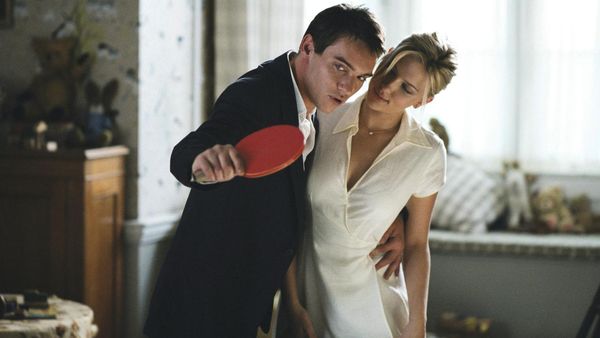Eye For Film >> Movies >> Match Point (2005) Film Review
Match Point
Reviewed by: The Exile

The critical orgasms erupting around Match Point, Woody Allen's latest wallow in adultery and high-end real estate, are as mystifying as the director's late-life admiration for venality and blatant misogyny. To be sure, the whiff of greed and corruptibility has always floated around his films, but in the past he has been careful to take the edge off with humour, and, at a minimum, psychological or spiritual consequences. Applauding downright nastiness has never been Woody's style. Even in 1989's Crimes And Misdemeanors - the film to which Match Point is most often compared - the despicable behavior of the main character is prompted by fear of loss rather than desire for gain.
Match Point is another beast entirely, an immorality tale so cynical it takes your breath away. The place is London, instead of the director's usual Manhattan, though why he bothered to switch locations is a mystery: the Thames-side penthouses and expensive restaurants deliver the same jolt of obscene wealth as the Upper West Side apartments of yore and the English characters who populate the film are just as self-obsessed as his usual stable of neurotic New Yorkers. What's different is Allen's awkwardness with the class-driven plot and British conversational rhythms; try as he might - and he tries so hard his cast is thyroidal from straining to please him - every action looks stiff and every exchange sounds stilted. Rarely have so many excellent actors worked so hard in the service of so little.

The opening, however, is marvelously subtle as Irish tennis pro Chris Wilton (Jonathan Rhys Meyers) takes a coaching job at a fancy country club and bonds with student Tom Hewett (Matthew Goode). While the men - both young, handsome and athletic - discover a mutual love of opera and make plans to meet, the scene develops a homoerotic charge that Allen doesn't know how to exploit. Luckily, cinematographer Remi Adefarasin does, gliding his camera around the men as though tying them together and catching Rhys Meyers with sidelong angles that hum with sexual tension. At this point Chris seems dangerous and magnetic, a Ripley-esque charmer with plenty up his sleeve, but as he infiltrates Tom's family and marries his sister (a twittering Emily Mortimer), we discover he's just another social climber too stupid to keep his zipper up. The minute Chris loses his head the movie loses its own.
At least, the object of his lunacy is worth it - Tom's fiancee, Nola (Scarlett Johansson), a struggling American actress with the soul of a grifter and the body of Monroe. When Chris first sees her at the Hewett country estate, she's packed into a white dress and bending over a ping-pong table. Soon they're going at it on the lawn in the middle of a downpour (Woody movie sex has never been this pleasingly dirty). Yet despite the compelling eroticism of its leads - whose gleaming skin and matching trout lips are wondrously photogenic - Match Point never transcends the laziness of the writing.
A chance meeting in the Tate Modern is orchestrated so poorly the tension evaporates (both Hitchcock and De Palma have used museums as stages for sexual fixation, and the homage falls flat). Most disappointingly, Allen attempts to justify the film's shocking violence by transforming Nola from a husky-voiced fantasy to a needy shrew (to him, all mistresses are the same), but nothing can disguise the real reason blood is spilled. Sex may give Match Point life, but it's money that gives it purpose.
Reviewed on: 05 Feb 2006




















